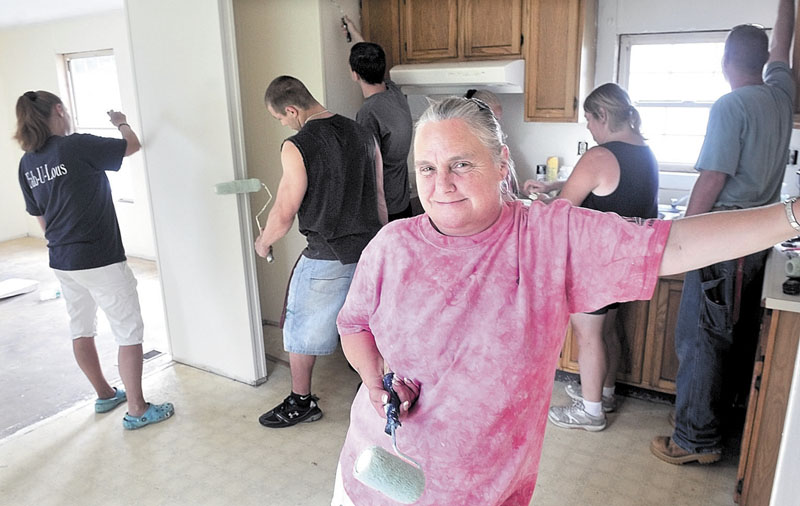FARMINGTON — Diane Schubarth didn’t know much about home improvement when she volunteered last year for a community project that is renovating mobile homes in her Farmington neighborhood.
Standing alongside some of her fellow volunteers Wednesday afternoon, however, the 50-year-old smiled and admired a mobile home she helped renovate since starting the project.
“When I first started, I didn’t know how to paint, spackle or do anything,” Schubarth said. “Now I know how to do it all myself.”
She is among six residents in the High Street neighborhood working on the project being managed by Western Maine Community Action, a social service agency that partnered with town government and other civic agencies to access $250,000 in federal grant funding for the renovations, according to project coordinators.
This small group of volunteers has helped renovate three mobile homes so far, learning about home repairs along the way and keeping project costs down by reducing the amount spent on contractors.
The project’s goal is to install energy-efficient upgrades and make other repairs to make the 16 mobile homes more affordable for low-income residents living in the neighborhood.
Project coordinators believe getting more people to volunteer may be the key to reaching that goal.
Volunteer coordinator Dot Gordon is struggling to find people from outside the neighborhood to volunteer, she said.
“We’ve put flyers out, newspaper articles out looking for help, and we’re just not getting it,” she said.
The project needs about six more volunteers showing up on a regular basis to avoid spending more on contractors, according to Gordon, 54, who is a former neighborhood resident.
“If we had more volunteers, we could stretch the grant dollars further by doing some of the minor repairs instead of the contractors,” she said.
More money to pay for the renovations is expected to come from government programs that fund weatherization projects and energy-efficiency upgrades, according to Diane Haley, housing specialist for Western Maine Community Action.
But getting more volunteers is important to making sure there is enough money to pay for contractors to do the more highly skilled repairs, according to Haley.
Haley said a significant amount of the $172,000 that Franklin County gets each year for weatherization projects will be spent on the High Street project, which serves low-income residents who rent or own the mobile homes built about 20 years ago.
To be eligible for the renovations, a family of four can earn no more than $41,600 in annual income. A family of two must have an annual income below $33,300.
“We’re trying to get to them all,” she said, referring to the 16 projects that are eligible for the renovations.
Gordon is one of two regular volunteers that don’t live in the neighborhood, where her 79-year-old mother, Helene, lives in one of the mobile homes, she said.
Gordon signed up to manage the volunteers to keep a promise to her father, Joseph Bryant, who lived in the neighborhood for 30 years with Helene before his death last spring at age 84, she said.
Her father was active with the social service agency that started the project, and he died before getting a chance to fulfill his plan to work alongside his neighbors, she said.
“I made a promise to him and said I’d do it for my dad,” Gordon said. “If I can help another person have a better place, I’m going to do whatever I can.”
The project got a boost recently when two high school students started volunteering through the Upward Bound program, which is hosted at the University of Maine at Farmington in the summer for students to take classes and work in the community to get ready for college, according to Gordon.
Cindy Silva, another resident who is volunteering, had her roof replaced by the project and is waiting to replace her windows and doors, she said.
The 49-year-old said she couldn’t afford the repairs without the project. She owns her mobile home but is disabled and unable to work, she said.
Silva volunteered because she wanted to improve the quality of life for the entire neighborhood, she said.
The project has brought the residents closer together and instilled a feeling of pride in where they live, according to Silva.
“We call ourselves a community now,” she said.
David Robinson — 861-9287
drobinson@centralmaine.com
Send questions/comments to the editors.



Success. Please wait for the page to reload. If the page does not reload within 5 seconds, please refresh the page.
Enter your email and password to access comments.
Hi, to comment on stories you must . This profile is in addition to your subscription and website login.
Already have a commenting profile? .
Invalid username/password.
Please check your email to confirm and complete your registration.
Only subscribers are eligible to post comments. Please subscribe or login first for digital access. Here’s why.
Use the form below to reset your password. When you've submitted your account email, we will send an email with a reset code.